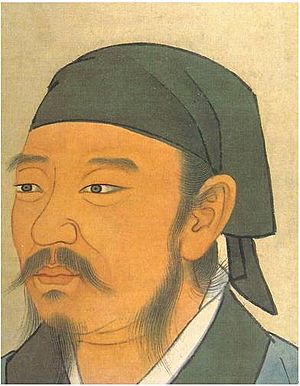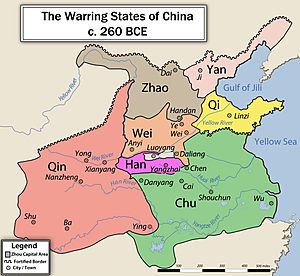Xun Kuang facts for kids
Quick facts for kids
|
|
|---|---|

Imaginary portrait of Xunzi, Qing dynasty (1636–1912), Palace Museum
|
|
| Born | c. 310 BCE |
| Died | After c. 238 BCE (aged mid 70s) |
| Era | Hundred Schools of Thought (Ancient philosophy) |
| Region | Chinese philosophy |
| School | Confucianism |
| Notable students | Han Fei, Li Si |
|
Main interests
|
Ritual (Li), Human nature, Education, Music, Heaven, Dao, Rectification of names |
| Xun Kuang | |||||||||||||||||||||||||||||||||
|---|---|---|---|---|---|---|---|---|---|---|---|---|---|---|---|---|---|---|---|---|---|---|---|---|---|---|---|---|---|---|---|---|---|
| Chinese | 荀況 | ||||||||||||||||||||||||||||||||
|
|||||||||||||||||||||||||||||||||
| Alternative Chinese name | |||||||||||||||||||||||||||||||||
| Traditional Chinese | 荀子 | ||||||||||||||||||||||||||||||||
| Simplified Chinese | 荀子 | ||||||||||||||||||||||||||||||||
|
|||||||||||||||||||||||||||||||||
Xun Kuang (Chinese: 荀況; born around 310 BCE, died after 238 BCE), also known as Xunzi (Chinese: 荀子; meaning 'Master Xun'), was an important Chinese philosopher. He was a follower of Confucianism and lived during the late Warring States period.
Xunzi is considered one of the three greatest Confucian thinkers of ancient times, along with Confucius and Mencius. During his era, Confucian ideas faced many challenges from other philosophies like Daoism and Mohism. Xunzi helped combine these different ideas with older Confucian teachings. This made Confucianism stronger and helped it become very important in the Han dynasty and throughout East Asian history.
His writings are collected in a book called Xunzi, which is still in great condition today. Unlike some ancient texts, most scholars agree that Xunzi himself wrote these texts. However, a historian named Liu Xiang probably organized them into the book we know today, centuries after Xunzi's death.
Xunzi was born in the State of Zhao. He studied at the famous Jixia Academy, where he learned about all the main philosophical ideas of his time. Later, he traveled and became a respected teacher. Two of his most famous students were Han Fei and Li Si, who became important political figures. Some of their ideas, known as Legalism, were different from Xunzi's.
Xunzi's writings often discuss and criticize other thinkers. He famously believed that "Human nature is evil," which is different from Mencius, who thought human nature was good. However, like Mencius, Xunzi believed that education and ritual were essential. He thought these practices could help people improve themselves and overcome their natural bad tendencies. He encouraged learning throughout life and applying rituals to all parts of life.
Xunzi also thought music was very important and that people should use names carefully. Even though he respected ancient wise leaders, he focused more on learning from recent rulers. Over time, his ideas, especially his view on human nature, were often misunderstood. This led to his philosophy being less popular after the Tang Dynasty. By the 10th century, Mencius's ideas became more favored. However, since the 20th century, people in East Asia have started to appreciate Xunzi's teachings again, recognizing their lasting impact.
Contents
Life and Times
Early Life and Studies (c. 310–284 BCE)

Xunzi was born as Xun Kuang (荀況), likely around 310 BCE. During his lifetime, he was probably known as Xun Qing (荀卿), which means 'Minister Xun'. His birthplace was Zhao, a state in what is now the Shanxi Province of north-central China. We don't know much about his early life, but historical records say he was a very talented student.
When he was about 13 to 15 years old, Xunzi traveled to the state of Qi. There, he attended the Jixia Academy, which was the most important center for philosophy in ancient China. At the academy, Xunzi learned about all the major philosophical schools of his time. He also learned the art of shuo (說), which was a formal way of arguing to persuade rulers.
Time in Chu and Return to Qi (c. 283–265 BCE)
Around 283 BCE, Xunzi moved to the state of Chu. He became very skilled in a type of poetry called fu. His book of poems, though now lost, was highly regarded for many centuries. Chu was often attacked by the Qin state, and these events likely influenced Xunzi's later writings.
Around 275 BCE, Xunzi left Chu and returned to the more stable state of Qi. He was welcomed back as a respected thinker. The Shiji says that King Xiang of Qi honored Xunzi greatly. This suggests Xunzi might have become the head of the Jixia Academy, or at least a very important teacher there. During this time, he wrote many of his most important philosophical works.
Xunzi was called "the most revered of teachers." His most famous students were Han Fei and Li Si. Both became very important in politics and academics. Li Si later became the Prime Minister of the Qin dynasty, which affected Xunzi's reputation. Xunzi left Qi around 265 BCE.
Later Travels and Career (c. 265 – after 238 BCE)
After leaving Qi, Xunzi visited the state of Qin, possibly between 265 and 260 BCE. He hoped to convince Qin's leaders to follow his ideas about leadership. However, the state of Qin was strongly influenced by Legalist ideas.
Xunzi praised many of Qin's achievements and its government. But he also pointed out that Qin lacked Confucian scholars and did not encourage education enough. He warned that this would cause other states to unite against Qin. He met with King Zhaoxiang, but the king was not convinced and did not offer him a position.
Around 260 BCE, Xunzi returned to his home state of Zhao. There, he discussed military matters with Lord Linwu in the court of King Xiaocheng of Zhao. He stayed in Zhao until about 255 BCE.
In 240 BCE, Lord Chunshen, the prime minister of Chu, invited Xunzi to become the Magistrate of Lanling. Xunzi first refused but then accepted the job. However, Lord Chunshen was killed in 238 BCE, and Xunzi lost his position. He then retired and lived the rest of his life in Lanling, which is now in southern Shandong province. He was buried there. The exact year of his death is unknown.
Xunzi's Philosophy
Human Nature
One of the most famous parts of Xunzi's philosophy is found in chapter 23 of his book, titled "Human Nature is Evil." The idea of Human nature, called xing (性), was a topic that Confucius discussed, but not very clearly. This left room for later philosophers to develop their own ideas.
Xunzi believed that people are born with selfish or "evil" tendencies. He thought that rules and good behavior were created to help people correct these natural tendencies. This view is more serious and less hopeful than the Confucianism of Mencius, who believed humans were naturally good.
However, like most Confucians, Xunzi believed that people could become better through education and ritual. He wrote:
Now, since human nature is evil, it must await the instructions of a teacher and the model before it can be put aright, and it must obtain ritual principles and a sense of moral right before it can become orderly.
Music's Importance
Xunzi wrote a lot about music, especially in chapter 20, called the "Discourse on Music." He disagreed with another philosopher named Mozi, who thought music was a waste of money and resources because it didn't provide basic needs.
Xunzi argued that music brings joy, which is very important for people's well-being. The Chinese words for joy (yue) and music (le) share the same character (樂), showing their close connection. Xunzi also explained how music helps create harmony in society:
故樂在宗廟之中,君臣上下同聽之,則莫不和敬;閨門之內,父子兄弟同聽之,則莫不和親;鄉里族長之中,長少同聽之,則莫不和順。
When music is played in the temple, rulers and subjects, high and low, listen together and feel respect and harmony. When music is played at home, fathers and sons, older and younger brothers, listen together and feel close kinship. When it is played in village meetings, old and young listen together and are united in obedience.
Many people have noticed that Xunzi's reasons for promoting music are similar to those of ancient Greek philosophers.
The Ideal Gentleman
Xunzi believed that a good government and society depended on the "gentleman" (junzi). This ideal person, trained through ritual and self-improvement, was the source of good standards, not just laws. His idea of a gentleman king and government, helped by wise Confucian scholars, was similar to Mencius's.
However, Xunzi did not support the old system where titles were passed down in families. He believed that a person's place in society should only be based on their own abilities and efforts, not on who their parents were.
See also
 In Spanish: Xun Zi para niños
In Spanish: Xun Zi para niños
 | Calvin Brent |
 | Walter T. Bailey |
 | Martha Cassell Thompson |
 | Alberta Jeannette Cassell |

